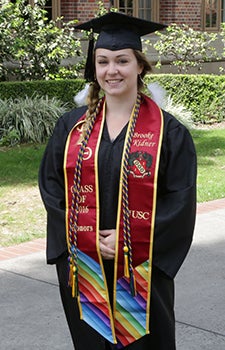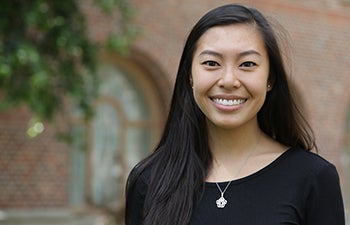
Scholarship, service and success mark three students’ academic journeys
Brooke Kidner: Willing and Able

Photo by Mike Glier.
It was 2014, and Brooke Kidner was in the hospital again. She was combating severe nausea, headaches and chronic nerve pain, and was sleeping nearly 20 hours a day.
“It felt like I’d been hit by a truck,” she said.
Kidner, a transfer student in her second semester at USC Dornsife, was having a relapse of the rare neurological condition she’d been diagnosed with at age 13. Known as Arnold-Chiari Malformation, the disorder causes compression of the brain stem due to structural defects in the skull.
Kidner found the condition severely limited her ability to take part in physical activities. The Riverside native and former teacher of karate underwent three brain surgeries to alleviate the condition while a teenager, but beyond that there was little else doctors could do for her.
After graduating from high school in 2009 and a short stint in culinary school, Kidner attended community college in Riverside and in Los Angeles for almost three years, studying Arabic, Japanese and sign language. She entered USC Dornsife in Spring 2013 and declared a combined major in linguistics and psychology.
“The human mind has always fascinated me, and linguistics is not the study of foreign languages but how language works in the mind, how we are able to create it without even thinking about it,” Kidner said.
Her relapse a year later and the associated absences nearly caused her to fail a class, and her grade point average took a big hit. But between an adviser who advocated for her and a lot of hard work, Kidner managed to stick it out. Since then she has remained mostly asymptomatic, abiding by a long list of restricted activities, and this has given her the opportunity to get heavily involved with activities at USC and in the community.
As a senior, Kidner began participating in Jumpstart, a national early education organization that sends university student volunteers into under-resourced preschool classrooms to improve the students’ language and literacy skills. USC volunteers spend several hours per week working on reading and comprehension with the preschoolers.
She is involved in Undergrad Students in Linguistics at USC, where she programs social and academic events. A woman of Cherokee descent, Kidner is also part of the USC chapter of the national Native American Student Union organization, which organizes service-oriented activities and events.
Kidner integrated her Native American heritage into her undergraduate thesis by studying the metrical stress patterns of the Lakota language, analyzing where the emphasis is placed on different words. This Spring, she visited the Pine Ridge Reservation in South Dakota to do field work with native speakers.
Kidner’s road to graduation has been lengthy and complicated, which makes her arrival even sweeter.
“It took me a really long time and an arduous journey to get here so I am making the most out of graduation, the ceremony, everything.”
She said her medical condition has given her perspective on how to live life.
“With my unique experience of being disabled and not knowing when I’m going to relapse, my attitude is, ‘Do it now,’” she said.
Case in point: She is deferring her enrollment in a master’s program at the University of Chicago in order to teach English in Spain for a year.
“I’m healthy enough to do it, so this is the year I’m going to be able to make a difference in my life and others’ and get some rewarding experiences out of it. Because that’s what life is all about — not selfies, trinkets or souvenirs. It’s about experiences.”
Will Orr: Third-Generation Trojan
Double-majoring in history and law, history and culture, Will Orr is getting ready to attend Stanford Law School this Fall.
Kirsten Herr: Finding the Human Side
Senior Kirsten Herr developed a passion for the life sciences while at Harker High School in Saratoga, Calif. She took courses in biology and physiology and found them fascinating.
“In most classes you’re present, but there are some where you’re really engaged, and there’s a huge difference,” she said. “When you get home after school you realize you don’t actually have to study because you remember it all from class. That’s kind of how biology and physiology work for me.”
That experience of being fully engaged in her studies convinced Herr that she would like to pursue a health-care career, but when she arrived at USC in Fall 2012, she knew she didn’t want to follow the typical pre-medicine path. Instead, she hoped to broaden her horizons, so declared health and humanity as her major.
“I didn’t want to limit myself by taking a strictly chemistry, biochemistry, or biology route,” she said. “So I looked at some hybrid options, and health and humanity seemed like the perfect option for me.”
The major’s emphasis on the human experience seemed particularly apt for Herr, who spent a large portion of her time at USC volunteering in the community near USC’s University Park Campus.

Photo by Mike Glier.
As a freshman, she began donating time at nearby Orthopaedic Institute for Children. “Orthopaedic was just a quick walk away from campus, so I spent a few hours there every week,” she said. The experience working with patients and their families proved life-changing and captivating.
“I just had to keep going back,” Herr said.
Later in her freshman year, she met another volunteer at the hospital who had been placed through Trojan Health Volunteers (THV), a part of USC Dornsife’s Joint Educational Project (JEP). The chance encounter led her to become more deeply involved with THV and JEP.
“JEP has really been the changing point in my academic and social career,” Herr said. “Tammy Anderson, who is the executive director of the program, exposed me to this different side of health care.”
Herr described how Anderson helped expose her to a side of the profession they might not otherwise have experienced through meetings with leaders of local hospitals.
“Being able to participate and contribute ideas in those meetings was really influential,” Herr said. “That lights a fire under you.”
Herr, who became assistant director of THV in her junior year and moved up to director this year, also volunteered at California Hospital Medical Center. There, her Spanish language skills — she is double-minoring in Spanish and psychology — came in particularly handy. She helped translate between patients and their nurses and physicians.
“It’s nice to see that increased connection that you get when you speak in someone’s native language,” she said.
As she contemplates graduation and reflects on her experiences at USC, Herr advises other students aiming for medical careers to look for ways to expand their horizons and ensure the profession is right for them — that it makes them happy.
“For freshman pre-health and pre-med students, obviously their mind is on their end goal, and I think that’s great,” she said, “but that’s not everything. Medicine is a noble profession, but you do need to be passionate about it.
“To be successful, you should be doing something that you really enjoy.”